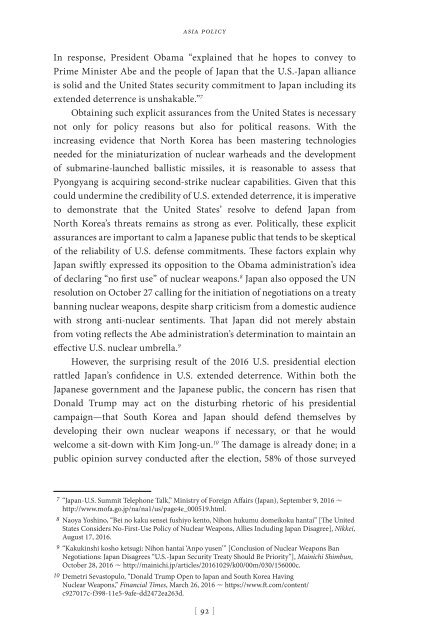2jBVKVf
2jBVKVf
2jBVKVf
You also want an ePaper? Increase the reach of your titles
YUMPU automatically turns print PDFs into web optimized ePapers that Google loves.
asia policy<br />
In response, President Obama “explained that he hopes to convey to<br />
Prime Minister Abe and the people of Japan that the U.S.-Japan alliance<br />
is solid and the United States security commitment to Japan including its<br />
extended deterrence is unshakable.” 7<br />
Obtaining such explicit assurances from the United States is necessary<br />
not only for policy reasons but also for political reasons. With the<br />
increasing evidence that North Korea has been mastering technologies<br />
needed for the miniaturization of nuclear warheads and the development<br />
of submarine-launched ballistic missiles, it is reasonable to assess that<br />
Pyongyang is acquiring second-strike nuclear capabilities. Given that this<br />
could undermine the credibility of U.S. extended deterrence, it is imperative<br />
to demonstrate that the United States’ resolve to defend Japan from<br />
North Korea’s threats remains as strong as ever. Politically, these explicit<br />
assurances are important to calm a Japanese public that tends to be skeptical<br />
of the reliability of U.S. defense commitments. These factors explain why<br />
Japan swiftly expressed its opposition to the Obama administration’s idea<br />
of declaring “no first use” of nuclear weapons. 8 Japan also opposed the UN<br />
resolution on October 27 calling for the initiation of negotiations on a treaty<br />
banning nuclear weapons, despite sharp criticism from a domestic audience<br />
with strong anti-nuclear sentiments. That Japan did not merely abstain<br />
from voting reflects the Abe administration’s determination to maintain an<br />
effective U.S. nuclear umbrella. 9<br />
However, the surprising result of the 2016 U.S. presidential election<br />
rattled Japan’s confidence in U.S. extended deterrence. Within both the<br />
Japanese government and the Japanese public, the concern has risen that<br />
Donald Trump may act on the disturbing rhetoric of his presidential<br />
campaign—that South Korea and Japan should defend themselves by<br />
developing their own nuclear weapons if necessary, or that he would<br />
welcome a sit-down with Kim Jong-un. 10 The damage is already done; in a<br />
public opinion survey conducted after the election, 58% of those surveyed<br />
7 “Japan-U.S. Summit Telephone Talk,” Ministry of Foreign Affairs (Japan), September 9, 2016 u<br />
http://www.mofa.go.jp/na/na1/us/page4e_000519.html.<br />
8 Naoya Yoshino, “Bei no kaku sensei fushiyo kento, Nihon hukumu domeikoku hantai” [The United<br />
States Considers No-First-Use Policy of Nuclear Weapons, Allies Including Japan Disagree], Nikkei,<br />
August 17, 2016.<br />
9 “Kakukinshi kosho ketsugi: Nihon hantai ‘Anpo yusen’ ” [Conclusion of Nuclear Weapons Ban<br />
Negotiations: Japan Disagrees “U.S.-Japan Security Treaty Should Be Priority”], Mainichi Shimbun,<br />
October 28, 2016 u http://mainichi.jp/articles/20161029/k00/00m/030/156000c.<br />
10 Demetri Sevastopulo, “Donald Trump Open to Japan and South Korea Having<br />
Nuclear Weapons,” Financial Times, March 26, 2016 u https://www.ft.com/content/<br />
c927017c-f398-11e5-9afe-dd2472ea263d.<br />
[ 92 ]


